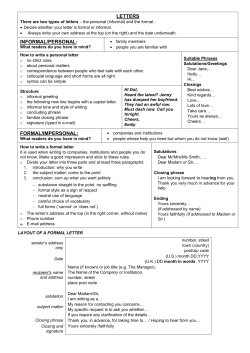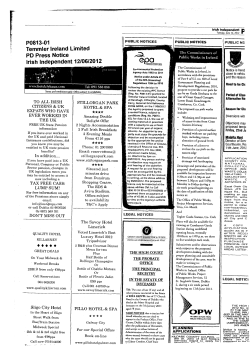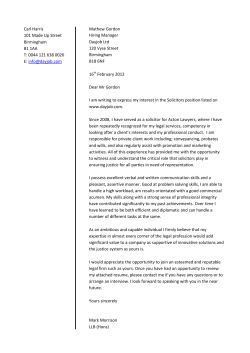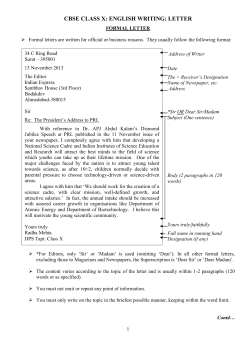
N Comment & Letters
Saturday, May 14, 2011 THE IRISH TIMES 15 Comment&Letters THE IRISH TIMES 24-28 TARA STREET, DUBLIN 2 SATURDAY, MAY 14TH, 2011 irishtimes.com T Wellbeing of the over-50s HE PUBLICATION this week of an initial report into the health and social status of the over-50s represents the first feedback from the most comprehensive study of its kind ever undertaken in the State. The Irish Longitudinal Study on Ageing is a 10-year prospective study of the health, social and economic circumstances of a representative sample of 8,000 people aged 50 years and older. It is due to be completed in 2018. Led by Prof Rose Anne Kenny of Trinity College Dublin, the ¤12 million research project will provide policymakers and service providers with in–depth and reliable information needed to plan for the future needs of older people. While the initial results show the majority of older people consider themselves healthy and are enjoying life, objective measurements of health parameters by researchers show how health declines with age. The prevalence of blood pressure problems, for example, increases from 30 per cent in those aged 50-64 years to 54 per cent in the over 75s. Some three–quarters of those surveyed are either overweight or obese. Perhaps the most significant finding to date is the level of undiagnosed illness revealed by the screening process. Almost six in ten cases of hypertension in men and 50 per cent of cases in women had not been identified previously. The results also highlight the existence of a “sandwich” population of older people who use health services to a lesser degree. Among those identified as being in poor health, attendance at either GP clinics or emergency departments is lower among those not poor enough to qualify for a medical card but who are unable to afford private health insurance. This suggests the existence of a vulnerable group of over-50s who are most likely to experience unidentified and untreated illness. Of those screened and found to have objective evidence of depression, 78 per cent did not report a doctor’s diagnosis of depression. Levels of anxiety were also under-diagnosed. This diagnostic deficit is disturbing and warrants immediate action by health professionals working at the frontline as well as by those charged with planning primary healthcare for older people. A consistent finding is that people with higher levels of education and wealth enjoy better health outcomes in later life. It is a reminder that inequalities in health arise from social parameters set early in life. On a positive note, people aged over 50 are a huge source of support to their adult children, and more than a quarter of them undertake voluntary work at least once or twice a month. Among those with surviving parents, some 25 per cent provide an average of 18 hours personal care each week for their parents. These findings underline the valuable societal role played by older people among their extended families as well as in the wider community. This study is a valuable and strategic investment for the nation. The Minister for Health must ensure that its first report does not gather dust and that these early findings are acted upon by policymakers. ‘L Illegals in the US OVE YE therefore the stranger: for ye were strangers in the land of Egypt.” President Obama was quoting from Deuteronomy at a Hispanic prayer breakfast this week. It reminds us, he said, “to look at that migrant farmer and see our own grandfather disembarking at Ellis Island, or Angel Island in San Francisco Bay; and to look at that young mother, newly arrived in this country, and see our own grandmothers leaving Italy or Ireland or Eastern Europe in search of something better.” On Tuesday in El Paso in a major speech he also insisted that "the overwhelming majority of these folks are just trying to earn a living and provide for their families" and contribute positively to the US economy. It is a sympathetic although controversial line, one that will, however, certainly endear him to a large Hispanic voting bloc which was critical to his election in 2008 and will be again in 2012. And, no doubt, to the young Irish campaigning for reform. But in relaunching at six events over two weeks his welcome campaign for immigration reform – a “moral imperative” – a bid to regularise the position of 11 million undocumented without legal status Obama has returned to a cause that has frustrated him repeatedly since his election. And prospects for rekindling it are no better now that the House has come under control of the Republicans, implacably opposed as they are to any measure that might lead to eventual citizenship – “reward for illegality” – for illegal immigrants. The speeches also come against a background of increasingly determined anti-immigrant action by up to a dozen states debating measures to tighten their own laws. Obama has been forced to match his calls for a path to citizenship with a simultaneous insistence he is as tough as anyone on enforcement of border controls. Nearly 400,000 immigrants were deported last year, there is tighter security along the Mexican border, and workplace inspections for illegal employees are up. Democrats have pushed modest changes such as the DREAM Act, supported by Obama, which would allow people who immigrated illegally as children or teenagers to achieve permanent-resident status if they complete post-secondary education or military service. The Bill, a new version of which was introduced on Wednesday, is unlikely to succeed and Obama, unwilling to be seen bypassing Congress, has refused to use discretionary powers to overrule such deportations. In truth, the undocumented will be waiting until 2012. Letters to the Editor Email: lettersed@irishtimes.com (no attachments) Post: Letters to the Editor, 24-28 Tara St, Dublin 2 Fax: 01-6758035. Note: please provide name, postal address (at end of the letter) and telephone numbers. Letters may be edited or cut. Queen Elizabeth’s visit Madam, – I am looking forward with a degree of trepidation to the Queen’s visit to our shores. Let me hasten to add that my fears are not concerned with the rightness or otherwise of the visit’s timing. I am worried that our Defence Forces’ performance of the military ceremonial involved may not be up to the routine standard of excellence delivered by her own services. As a former member of the reserve of our Army, I have to say that our performances over the years have been patchy, ranging from the sublime to the downright embarrassing. During the coming visit, the eyes of the world, not just those of the UK, will be on our military. Only a top-drawer performance will be acceptable. The Army top brass have had plenty of time to prepare for this, so there will be no excuses. Let the world see that whatever about being able to manage our economy, at least we can turn out a decent guard of honour. – Yours, etc, ANDY JONES, Mullagh, Co Cavan. Madam, – The forthcoming visit of the Queen is welcome to most Irish people. I am sure the Queen is looking forward to it and it is about time that the head of state of a country with which we have full diplomatic relations is at last able to pay a formal visit. Apart from the historical aspect, it will also be a great boost to tourism for years to come. However, there is one thing that worries me as regards protocol. I hope that no Irish person embarrasses us by bowing or curtsying to the Queen or the Duke. No citizen of a Republic should bow or curtsy to royalty of any country. Remember, we are citizens; the British are subjects. The Queen herself, some 12 or 15 years ago, said publicly in Britain that it was not necessary for anybody to bow or bend the knee to her. The Queen should be greeted in the same way as the President of the United States. I have seen some footage recently on television of both Mary Robinson and Mary McAleese as Presidents of Ireland meeting the Queen in Buckingham Palace and Northern Ireland and both showed no deference to Her Majesty, other than as the head of state of any country with which we have close ties. - Yours, etc, JOHN GORMAN, Tallaght, Dublin 24. Madam, – All this talk of road closures, traffic restrictions, and so on brings a chilling reminder of the effect of last December’s snow. However, remember the words of the poet: If Windsor comes, can spring be far behind? – Yours, etc, ROBIN MILLER, Rathfarnham, Dublin 14. Question of debt forgiveness Madam, – Master of the High Court Edmund Honohan (Home News, May 12th) clearly wants current legislation updated to meet contemporary social and economic conditions in our country, specifically in relation to “debt forgiveness”. Mr Honohan appears to have a humane disposition towards the plight of so many people who are unable to meet their financial commitments. His comments are reassuring. However, what is really disturbing, apart from the financial and social misery of so many people, is the fact that various pieces of legislation remain on the statute books of the State, such as the 1840 Judgment Mortgage Act and the 1850 Debtors (Ireland) Act. The Law Reform Commission report published in 2004 provided recommendations for many of our current legal problems, and yet seven years later, these recommendations have not been implemented. Can we really call ourselves a progressive society if some of our laws are, to say the least, inappropriate and anachronistic? – Yours, etc, JOE McBRIDE, Stradbrook Grove, Blackrock, Co Dublin. Clarity on pension funds Madam, – You will remember that some years ago when Charlie McCreevy reduced the VAT rate, retailers did not reduce prices but just pocketed the difference. The same will happen again. It is galling to see my pension fund being pilfered to enrich fast food outlets, cinema owners and hairdressers. – Yours, etc, JOHN DORIS, Cabinteely Green, Dublin 18. Madam, – If someone I knew came to me and asked me if they could take a percentage of my hard-earned savings, I would have to satisfy myself that they are worthy of it and, most importantly, good for it. In the case of the pension levy, I would have to say no because, with respect, the Irish government is certainly not good for it. – Yours, etc, UNA BLAKE Lower Mayor Street, Dublin 1. Madam, – The political expedient of raising taxes on pension funds has already been executed in the UK with disastrous results. Following the Labour Party victory in the 1997 election, Gordon Brown, the then chancellor, removed the tax exemption on dividends received by pension funds from their shareholdings. In effect, this was a levy of around 0.6 per cent per annum. It raised a huge sum, ostensibly to pay for a temporary scheme to solve youth unemployment. It received public applause, including an editorial in the Financial Times, accompanied by the usual political rants about taxing wealthy tax dodgers. The result over time was the destruction of almost all privatesector final salary schemes. The compound interest effect of this tax increase was to render pension schemes unable to meet future obligations, with the inevitable result that employers had no option but to close them, initially to new employees and eventually to all employees. By this single misguided measure, the British government destroyed the entire private-sector final salary pension system that had ensured security in old age for the majority of the labour force, from factory labourers to company chairmen, usually from age 65. To add insult to injury, publicsector employees were unaffected and still retire to enjoy their goldplated, inflation-proofed final salary pensions from age 60. A lasting effect – also visible here in Ireland – is a rising resentment against the privileged position of the public sector, whose comfortable retirement is being paid for by a private sector destined to retire into comparative poverty. The ultimate injustice of it all is this: without the levy, pensions would be higher, and the increased spending of the pensioners would create more employment – without, of course, needing an army of overpaid civil servants to administer job creation schemes. – Yours, etc, BILL BAILEY, Kilcacan, Ballineen, Co Cork. Morgan Kelly and the bailout Madam, – I was pleasantly surprised to note that Morgan Kelly’s prescription for the Irish economy was received favourably by most of the 12 economists quoted (Business This Week, May 13th). By my reckoning, only three did not agree with him; the others seemed to be in what might be termed provisional agreement. Two – Moore McDowell and John McHale – seemed to think he was criticising Patrick Honohan for the bank guarantee. In fact, Morgan Kelly’s criticism was that because Prof Honohan told the country that it needed billions of euro for a bank bailout on that infamous Morning Ireland radio programme, he seriously weakened what little negotiating leverage Brian Lenihan had with the EU-ECB. Granted, Mr Cowen and Mr Lenihan were playing their cards very poorly, especially regarding informing the Irish public. Still, it’s a hopeful sign that some notable Irish economists are thinking along the same lines. Now if we could only get the EU politicians to draw up a bailout programme that the markets would accept as sensible, then the PIIGS would be happy and the rest of the farm content. – Yours, etc, LIAM COOKE, Greencastle Avenue, Coolock, Dublin 17. Madam, – You chose 12 economists to comment on Morgan Kelly’s article and you couldn’t find one woman? – Yours, etc, LIZ GILL, Merton Park, Dublin 8. Madam, – The Cambridge economist AC Pigou, writing in 1920, is worth quoting in the context of Morgan Kelly’s doom-laden economic prognosis and solutions. “The error of optimism dies in the crisis but in dying it gives birth to an error of pessimism. This new error is born, not an infant, but a giant.” Our leading economists Good times and bad Thinking Anew T HE COMPARISON tale of Joseph being sold into slavery returns at Easter. The sale of a man by his brothers is echoed in the tale of the denial, betrayal and eventual execution of Christ. These were not the only times in history when a story of betrayal broke our hearts. Our histories and biographies are full of tales of disloyalty and cowardice. These tales are found in families, workplaces, clubs, churches and wherever else humans tend to gather together. There is another similarity between these two stories that is equally replicated in human life. This too is to be found in families, workplaces, clubs and churches, but is far more uplifting. In both stories the man who was to be the victim would triumph over the wrongdoings of others. Joseph’s salvation was economic but Christ’s was spiritual; the one had the foresight to plan for a recession, the other the hindsight to defeat despair. Recession and despair come hand in hand. They always have done and they always will do. We also know that life, both for individuals and society, has its ups and downs, good times and bad, profits and losses. With all the hand-wringing about who foresaw our recent downturn, you could easily get the idea that Ireland had forgotten its songs, its history and its prayers. The canon of Scripture may have been set but the story of God and his people is ongoing. Every grandmother lighting candles that I ever met knew that the bad times were near. Anybody tuned to the experience and rhythm of life foresaw the downturn. Those who appear to be afflicted with giant doses of this condition. – Yours, etc, JOHN O’BYRNE, Mount Argus Court, Harold’s Cross, Dublin 6W. Madam, – Is it not interesting that neither Prof Honohan nor his many supporters have, to date, refuted one of Prof Kelly’s key points: that Ireland’s unseemly rush to the IMF-EU bailout facility last November was forced upon the government by forces high up within the EU with the primary purpose of sending a warning shot across Spain’s bow? Spain’s economy is just too critical to be allowed to fall. The many opinion pieces and disagreements by professional economists to date vividly demonstrate that the so-called science of economics is undeserving of the title. – Yours, etc, DERMOT GOWAN, Sancerre Park, Wexford. thought those days would last forever were simply deluded. One of the great fruits of faith is the challenge it makes to delusion. The believer, from the very beginning, acknowledges that there are things far greater than he or she can understand. We know that human greed and the lust for power and influence have always brought suffering and we strive to conquer them. We have seen how they have destroyed so much in the past. We see its legacy in every place and in every time. The families burdened with negative equity today echo back to the rural depopulation of the 1930s, to the evictees of the 1840s and the dispossessed of the 1650s. A few years go by and the incredible suffering is consigned to a sympathetic page in a history book. Then we forget all about it and let it happen to another generation again. Against this we stand in that strange season between Easter and Ascension. We remember that surely confused time in the early church when all certainty was removed and a bleak future lay ahead. It An Irishman’s Diary Frank McNally N OW THAT the countdown to the centenary has begun, maybe it’s time for another attempt to clear up one of the last remaining mysteries of the Titanic, the true identity of the passenger known as “John Horgan”, who for 99 years has been as silent as the depths into which the ship sunk. It is of course a common Irish name. And that a person so christened held a passenger ticket (Third class, No. 370377) for the doomed vessel is beyond doubt. So is the fact that somebody used that ticket to embark from Queenstown on the fateful day. But the problem is that John Horgan’s apparent demise in the North Atlantic did not merit a single newspaper reference, other than his inclusion in the supposed passenger lists. Nor was he the subject of a compensation claim against the ship’s owners. Nor was any charitable disbursement made in his name from the relief funds set up in the tragedy’s wake. There was no death notice anywhere either. And if the late John Horgan had an estate to administer, there is no trace of related legal action. So it seems fair to assume that, whoever he was, John Horgan was safe on dry land somewhere when the Titanic went down. An obstacle to identifying ships’ passengers at the time, after all, is that this was the era before passports became an indispensable part of international travel. Thus passenger tickets could be, and were, freely transferred. Anyone who saw the 1997 cinema blockbuster will recall that Jack Dawson (Leo DiCaprio) wins his Titanic ticket in a dockside card game. And although this was not based on the story of any real-life passenger, it’s hardly the least credible part of the story of his love affair with Kate Winslet. Journalist and Titanic expert Senan Molony, author of several books on the subject, says that in common with 20 other passengers on the ship, Horgan had originally been listed to sail on a different vessel, the Cymric. This was scheduled to leave Queenstown on Easter Sunday – April 7th – 1912. When it couldn’t sail, ticket holders were instead booked onto the Titanic four days later. Dandelions and poetry One of the last remaining mysteries of the Titanic is the true identity of the passenger known as “John Horgan” Somebody using Horgan’s ticket did travel on that day, and – suggests Molony – may have done so in the company of one Patrick Dooley. At any rate, they had sequential tickets among those allocated to the rescheduled passengers. On the other hand, Dooley’s family had no knowledge of his friendship with any Horgan. So their proximity may have been mere coincidence. Dooley, who had been home from Chicago to see his elderly father, was from Patrickswell, Co Limerick. And when listing presumed victims, New York’s Irish World newspaper would later credit Horgan as being from Limerick too. Limerick is where the ticket was bought and the person holding it was, along with six other passengers from that county, among the last to board at Queenstown (it’s known that the connecting train from Cork was late arriving on the day). ASSUMING THE real John Horgan had sold his ticket after failing to sail the previous Sunday would certainly explain the lack of newspaper references to anyone mourning his death. It later emerged, for example, that a Cork publican, William O’Doherty, had bought the ticket assigned to one James Moran, and so died in the latter’s name. O’Doherty may in fact be a key to the mystery. He was said to have been friendly with another tavern worker, 19-year-old Timothy O’Brien, whom the Cork newspapers also insisted had gone down with the ship. The two were inextricably linked in newspaper reports. The Cork Examiner of April 17th, 1912, in an item headed “Believed Passengers”, referred to “William Doherty [sic], 12 Old Market Place, employed by Messrs W.F. O’Callaghan, Daunt’s Square, and Timothy O’Brien, billiard marker at the Oyster Tavern.” The rival Cork Constitution newspaper made the same connection. But Timothy O’Brien does not appear on the list of passengers. It could be, therefore, that he had followed O’Doherty’s example and bought his ticket from someone else, perhaps from John Horgan. The censuses of 1901 and 1911 provide clues about the identity of passengers, although they may also add to the confusion. The 1901 version shows a Timothy O’Brien, aged 8 and one of six children living at 196 Blarney Street, northwest Cork city, with their parents Denis and Margaret. This would have made him 19 in 1912. He doesn’t appear in the 1911 census in Cork, however. Instead there is a Timothy O’Brien of the same age working as a servant in a big house at Rockwell, Co Tipperary, where, incidentally, there is another young employee by the name James Landers, age 18. And while, as noted earlier, the Mansion House relief fund does not feature John Horgan among its Irish cases in a March 1913 report, it does list a mother with the surname Landers. The aforementioned James Landers appears to come from Tullamain, Limerick, his mother being a widow in the 1911 census. Molony speculates that perhaps Horgan sold his ticket to O’Brien, who in turn sold it on to Landers, who was the unfortunate man to sail. But if anyone has new information on the case, he’s waiting to hear from you now at the Titanic incident room: e-mail sennbrig@indigo.ie ● fmcnally@irishtimes.com Cheering on Jedward Madam, – OMG! Thank God we have no atheistic Eurovision fans. Madam, – Regarding the – Yours, etc, question in the verse quoted by TONY CORCORAN, Sheila Griffin (May 10th) “DandeFairbrook Lawn, lion, yellow as gold, What do you Rathfarnham, Dublin 14. do all day?”, the answer is, undoubtedly, propagate! Madam, – Is this year’s EuroviSeeing this year’s bumper crop sion about songs, or out-Jedof the weed, Patrick Kavanagh’s warding Jedward? – Yours, etc, apt “Dandelions growing on MICHELE SAVAGE, headlands, showing/Their unloved Glendale Park, Dublin 12. hearts to everyone” comes to mind. – Yours, etc, Madam, – Should Jedward ride VERA HUGHES, on the current wave of popularity Cartonkeel House, all the way to success tonight, and Moate, shoulder us with a bill for next Co Westmeath. year’s Eurovision, I have a suggestion. Surely we could do worse than to blow the rest of the EU-IMF bailout money on the best show ever staged in the competition’s history? Solid-gold seats for the audience would be one way to spend the cash. We could award Madam, – Perhaps Nama, after the victors with their own weight its donation of art to the National Gallery of Ireland (Home News, May 13th), should adopt for its logo the portrait of Lady Lavery as the idealised image of Ireland. Tarted up a little, but DEIRDRE MULLALLY — wearing a ragged shawl, of course. ADRIAN HILL – Yours, etc, Brendan and Patricia Mullally, NIALL McARDLE, Deansgrange, Co. Dublin are Wellington Street, delighted to announce the Ontario, engagement of their daughter Canada. Deirdre to Adrian, son of Robert Nama’s art collection in diamonds. Think of it as an experiment to test just how difficult it is to burn through the kind of money our bankers and developers managed in just a few years. Angela Merkel and Nicholas Sarkozy should have front-row seats to fully appreciate Ireland’s entry – AJ and the Troikas – as they toss money from buckets into the crowd and offer any bondholders present a free haircut. All contestants should be required to theme their songs around the subject of why Ireland should be allowed to keep its corporate tax rate. This may not be the best way to improve Ireland’s image among its more soberminded trading partners, but compared with what we’ve been doing up to now, it would be money well spent. – Yours, etc, CHARLIE PIKE, Leamore Lane, Newcastle, Co Wicklow. Social & Personal and Mary Hill (née Geaney), Plymouth, Devon. was there that we learned that we had to let Him go in order that He might live and opened our hearts and minds to receiving the Holy Spirit. It was through this that we learned how to hope again. We return to the next uphill struggle for faith and dignity, two things lacking in our society generally and in our churches particularly. It calls us back to the commands of love, to the challenge of praying for our enemies and those who hate us. That commandment received little sympathy when somebody suggested praying for bin Laden – even the good and holy scurried away from Jesus’s snub to human vengefulness. Peter did as such! A lot of what Christ said isn’t popular with the mob. But even the mob must learn that openness to the future is made impossible by clinging to the past. Sometimes we have to let things ascend and go unjudged beyond us if we wish to make progress as people. This includes those who have cheated and hurt, right through to those who kill recklessly. – F Mac E ESMOND GREENE — ÓRLA O'DONNELL Michael and Valerie O'Donnell of Rathfarnham, Dublin 14 are delighted to announce the engagement of their daughter Órla to Esmond, son of Michael and Mairéad Greene of Shankill, Co. Dublin. GEORGE P. O'MALLEY — HAYLEY P. CAPPER The engagement is announced between George, son of George and Laura O'Malley, Mountain View, Castlebar and Hayley, daughter of Stephen and Patricia Capper, Elm Park, Hornchurch, Essex, England. MISS SONIA CHAMP — DR. NEIL BARRETT Philip and Audrey Champ, Rathfarnham, Dublin are delighted to announce the engagement of their daughter Sonia to Neil, son of Jerry and Fidelma Barrett, Middleton, Co. Cork ROBIN GAHAN — CLARE MURPHY Robin and Clare, together with their parents, are delighted to announce their engagement. GARETH CRAIG — MOIRA WYNNE Gareth, son of Brian and Anne Craig of Killiney, and Moira, daughter of Henry Wynne of Kilbarrick, are delighted to announce their recent engagement. NADINE WAI O'FLYNN — ANDREW KING Nadine Wai O'Flynn, daughter of Michael and Choi Lin O'Flynn of Rathmichael, Co. Dublin and Andrew King, son of James and Maeve King of Ballsbridge, Dublin are delighted to announce their recent engagement. FIONA MILLS — ANNESLEY BARKER John and Anne Mills, Castleknock, Dublin have great pleasure in announcing the engagement of their daughter Fiona to Annesley, son of Annesley and Marian Barker, Stillorgan, Dublin. TANKARDSTOWN HOUSE, Slane, Co Meath ’Special Country House for your Special Day’ www.tankardstown.ie 041 9824621 _~êêó jççêÉ ~í melqldbkf` Ñçê ÄÉ~ìíáÑìä éÜçíçÖê~éÜó çÑ óçìê ïÉÇÇáåÖ Ç~óK melqldbkf`Kbr qÉäW OUQ RRQQ Frank Lyman’s new Summer occasion wear collection has arrived at Nestors, Galway. WEDDING Dresses from 299 at Marian Gale D.4.
© Copyright 2025





















